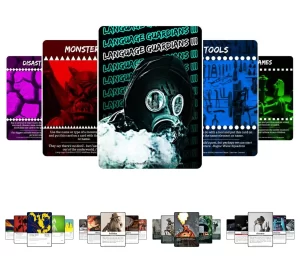At the outset, I want to make a distinction between games that are specifically designed for language learning and games that are not. There are plenty of fun games out there that are not specifically designed for language learning, but people adapt them for language learning purposes or simply play them in their target languages. That is a great way to learn, it is really fun, I have nothing against that, but that’s not what I mean when I say language card game.
When I say a language card game, what I mean is a card game expressly designed for the purpose of language learning. They are intended both for fun and educational purposes. By playing the game, players learn new words, grammar patterns, or cultural aspects of their target language and their abilities are stretched. In other words, language card games are not purely for fun and relaxation, rather they reaffirm what we know about our target languages and then take us beyond what we know.
Now, at this point, you may be wondering what kind of language card games are out there? Well, you may be surprised. Since I started my company and started researching the field, I found no less than two dozen for a variety of age groups and purposes, and I’m confident there are many more, it would just require a little more digging.
One of my favorite language card games that I see out there is Japanese: The Game. I think they have done great things for the field. I haven’t tried it only because I’m focusing on Mandarin Chinese, but I have seen it rumored online that they plan to release Mandarin and Korean expansions, so that would be something to look into.
Digame is a Spanish language card game I was really impressed by because they incorporated QR code onto their cards, so that players could scan the cards, which would take them immediately to a pronunciation video clip by a native speaker.
When it comes to systematic production and branding, I don’t think I’ve seen anyone who could beat the KLOO series. KLOO has many board games for French, Italian, Spanish, maybe German, if I recall, and some others. What’s great about that is if you really like the style of the game, you can play it in other languages without having to learn new rules or a new game. What you know about the game transfers over, so to speak.
If you want to go deeper into independent language card game producers, go to a place like The Game Crafter and search using the keyword ‘language’ or ‘language learning.’ You will find some interesting games there especially for indigenous languages. Sites like The Game Crafter have been great for providing a way for indie developers to protect and spread awareness of their endangered languages.
Alright that’s it for this episode. Don’t forget to like and subscribe so that you and other likeminded people can find your way back to my latest and greatest content. You can also head over to the Language Card Games’ Shop to buy a game, support what I do, and start playing your way to language-learning success today.

